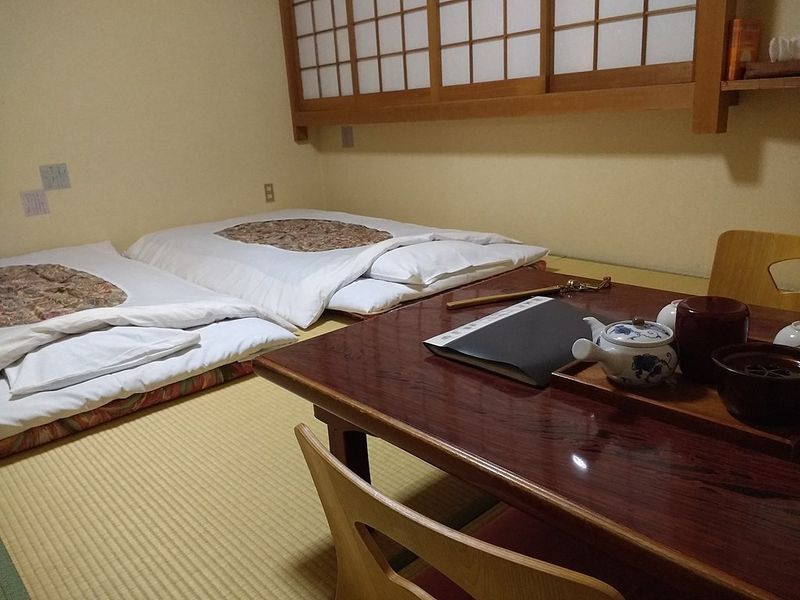Feb 9, 2024
How and where to stay when you travel in Japan
Many amazing travel experiences I’ve had were not just at atmospheric locations, but at the accommodations in which I’ve stayed during my travels. In 2024, I’m aiming to explore the prefecture and the wider region in which I reside. While making plans on where to stay, I consider what kinds of accommodations there are, price points, and how to book them.

A Nara City ryokan, photo Mx. Granger
Business hotels
For cheap and convenient, I opt for business hotels with Western-style rooms. These economical hotels have single or twin arrangements, en suite bathrooms, and comforts of home - towels, soap, toothpaste and toothbrush, and hair care stuff such as hair dryers and bath caps. You might find an iron and ironing board in the closet, too. They usually have free wifi and TV (either complimentary or for a fee). They’re a good choice if you’re traveling solo.
Traditional Accommodation
Traditional inns range from comfortable to spartan. First, 旅館 ryokan are traditional Japanese inns most commonly found in hot spring resort areas, though you find some vestiges in urban areas, too. Typically, they’re in buildings with traditional architectural features. You doff your shoes in a genkan, and step up into the reception in slippers where the staff greets you and shows you to a tatami room. In your room, there will be a low table with tea things, but no bedding. Ryokan staff usually serve dinner and breakfast in your room (sometimes a dining hall), and arrange your futons when you’re out. Guests don yukatas while inside the ryokan or visiting the baths.
A lovely ryokan I stayed at is in Aizu Wakamatsu City. Tagoto Cuisine Inn has delicious kaiseki course meals. The elderly ladies who run it ask that guests mind a curfew - they need their rest so that they can rise early to prepare the exquisite breakfast and dinners.
The budget version, 民宿 minshuku, is often in out-of-the-way places. The service and atmosphere are similar to a pension or bed and breakfast - serve yourself, lay out your bedding, and dine with the hosts and other guests. At Odawara, I enjoyed a stay at Jiyu Jin no Shuku in a Showa-era building run by a kind Chinese gentleman who speaks Chinese, Japanese, and English. Guests can prepare meals in a communal kitchen.
With the advent of room sharing, 民泊 minpaku were regulated in 2018. Since then, they’ve risen in price, but you can rest assured that compliant minpaku operators are following regulations for safety and health. When I book with minpaku, I prefer premises with hosts present. After all, I want to connect with local culture and people! One awesome private home I found on Hachijojima is Galaxy Guest House with out-of-this-world decor (mom is an artist) and comfy rooms.
Shukubo
For quiet and meditation, consider becoming a pilgrim in Japan and stay at 宿坊 shukubo, temple lodgings. It used to be that only monks and worshippers stayed at temples but these days, many temples open their doors to travelers. At Koyasan, the heart of Shingon Buddhism, I reserved both a room and a Buddhist 精進料理 shoujin ryouri meal. These meals use non-animal ingredients. Koyasan has a website for their shukubo and for places all over Japan, see Terahaku (Japanese language only).
How to book places to stay
I recommend checking Google Maps. You’ll see price comparisons between different online reservation platforms and often the hotel’s direct contact information. Bear in mind room occupancy - some places book by the number of guests while others have rates for the room. When you travel with children, always confirm whether there are beds or cots for children as co-sleeping is the norm in Japan.
Note that while travelers from abroad are required to show their passports to hotel staff, residents don't. As long as your home address is in Japan, you are not required to show ID, no matter what the staff claims.
What's your preferred kind of accommodation when you stay in Japan? Have you stayed in a capsule hotel in a pinch? How about love hotels while traveling?



0 Comments